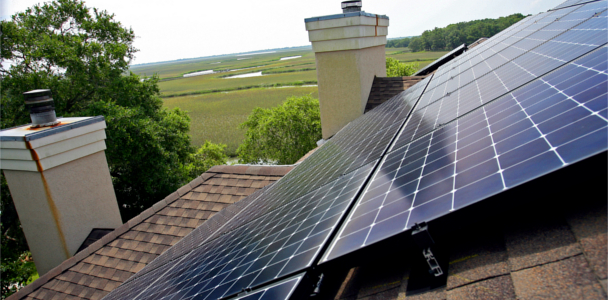Your decision to add solar panels to a roof may be to reduce electric bills or to generate your own personal energy source. Whatever the reason, installing a solar panel system on a roof is a large initial investment. The process of installing rooftop solar panels involves penetrating the roof, plus altering the house’s wiring and structural components. There are certain liability issues that must be addressed before installing solar panels on a roof.
Primary Concerns
The first step is to look through your home documents file to find out how many years are left on your home’s roof warranty. If the warranty will expire soon, it would be best to replace your roof before adding solar panels. Should you later discover a roof leak, it will cost far more money to remove the solar panels, install new shingles, and then re-install the solar panels.

If you're adding solar panels to your existing roof, be sure to understand how the installation will alter your asphalt roof warranty. Click here to get the Asphalt Roofing Manufacturers Association's technical bulletin on installing PV panels on an asphalt roof. Learn more »
Atlas Roofing Corp. recommends a comprehensive inspection performed by a qualified roof inspector as the next step. If this report indicates the roof needs to be replaced within three to five years, it advises homeowners to install the new roof and solar panel system at the same time.
Remember too that although solar panels cover roof shingles and reduce some weathering on the covered area, they do not qualify as a replacement for a roof. Conventional photovoltaic panels usually weigh between three and four pounds per square foot, and most roofs can hold double or triple that amount of weight. A qualified roof contractor should be able to determine the specific load capacity of your roof.
Warranty Worries
According to Atlas Roofing, the addition of solar panels, using proper installation procedures, should not invalidate your roof warranty. However, they recommend any solar system installed includes its own warranty covering roof integrity protection.
Atlas also advises homeowners to consult their insurance agent to be sure solar panels will be covered by the home’s insurance policy. If protection has to be added to the policy, the extra cost should be minimal, although rates differ state by state.
Penetration issues should be minimal as standard solar modules are secured with just four hex bolts. The precise method used to attach photovoltaic panels to your roof depends on the type of roof materials. Typically, panels on shingle roofs are attached with mounts bolted into the strongest roof rafters and then rails are attached to those mounts. A sealant should be applied into and around those mounts. Roof flashing to serve as an extra barrier against rain should also surround these mounts.
The Other Warranty
Once you have confirmed all roofing product warranty coverages, the next way to protect your investment is to be sure your solar installer is insured and certified. Many contractors have achieved certification by the North American Board of Certified Energy Practitioners (NABCEP). Ask how long the contractor has been installing rooftop solar systems and, most importantly, if he has active liability insurance and bonding capacity.
Solar panel installation will most likely require a municipal building permit. An experienced contractor should know what local codes are needed, and some even prepare permit documents for you. Be sure to obtain proper municipal building permits to protect against unnecessary and costly legal action from code infractions.
There are several ways to warrant your complete roofing investment against costly liability issues. The best warranty is the one you create by due diligence in all these areas. Atlas Roofing recommends choosing a contractor who complies with the best practices procedures of the Asphalt Roofing Manufacturers Association (ARMA) on all solar system installations.




 Gear!
Gear! PRO LOGIN
PRO LOGIN